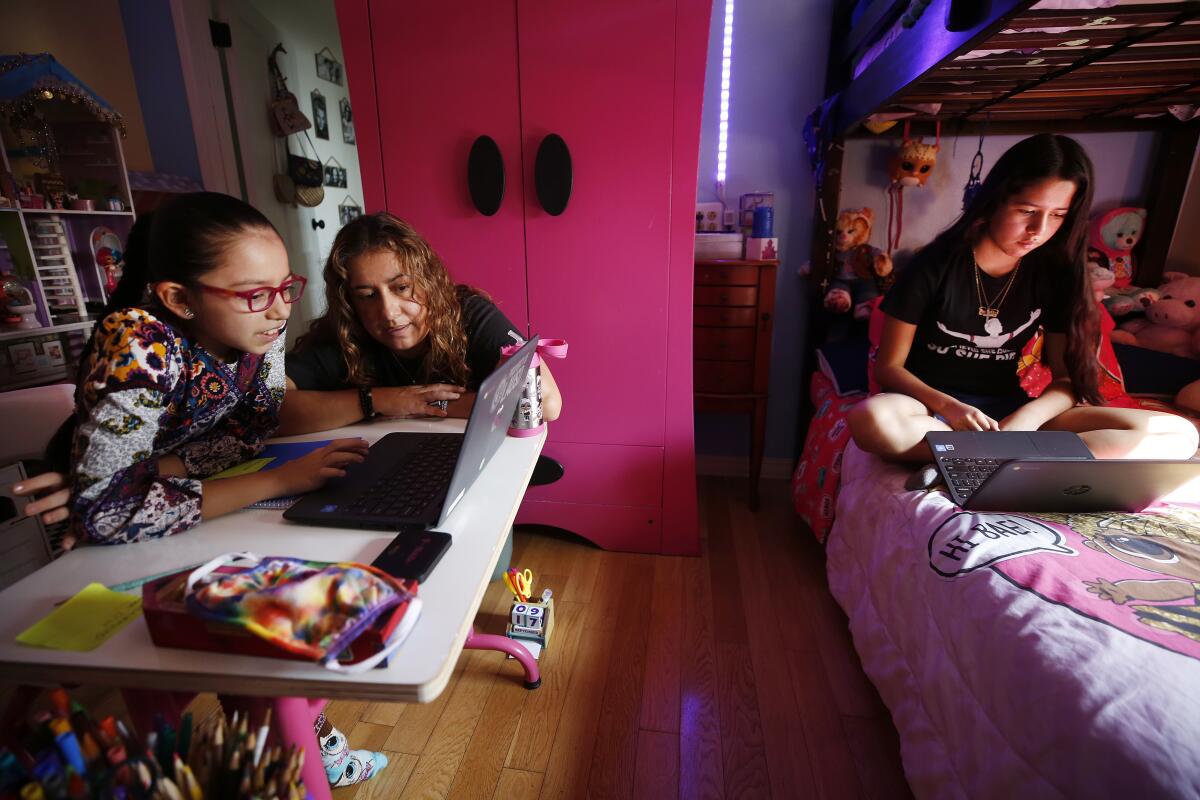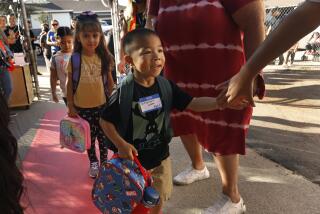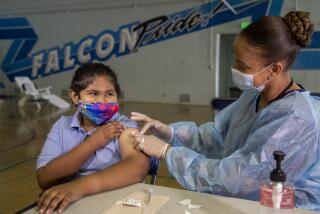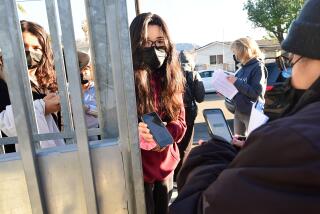Will California campuses reopen this school year? It depends on vaccinating teachers, infection rates

- Share via
Saving the Los Angeles school year has become a race against the clock — as campuses are unlikely to reopen until teachers are vaccinated against COVID-19 and infection rates decline at least three-fold, officials said Monday.
The urgency to salvage the semester in L.A. and throughout the state was underscored by new research showing the depth of student learning loss and by frustrated parents who organized statewide to pressure officials to bring back in-person instruction.
A rapid series of developments Monday — involving the governor, L.A. Unified School District, the teachers union and the county health department — foreshadowed the uncertainties that will play out in the high-stakes weeks ahead for millions of California students.
“We’re never going to get back if teachers can’t get vaccinated,” said Assemblyman Patrick O’Donnell (D-Long Beach), who chairs the state’s Assembly Education Committee and has two high schoolers learning from home.
He expressed frustration that educators are not being prioritized by the L.A. County Health Department even as teachers in Long Beach are scheduled for vaccines this week. Although Long Beach is part of L.A. County, it operates its own independent health agency.
L.A. health officials said Monday that there are simply too many people in high-priority categories who need vaccines and too few doses.
Health Director Barbara Ferrer said she hopes teachers in her jurisdiction could begin to be immunized in February or March, but that would depend on the vaccine supply. Last week, local officials estimated it may take until June for those 65 or older to be vaccinated. The last day of instruction for the current school year in Los Angeles is June 10.
In remarks Monday, Gov. Gavin Newsom called vaccines “the light at the end of the tunnel,” and said he was “focused on taking the steps needed to get Californians safely vaccinated as quickly as possible.”
With virus levels still dangerously high, but trending in a better direction, Newsom eased restrictions on businesses and highlighted progress on speeding up the pace of vaccinations, but provided less clarity about when teachers across the state would be immunized.
When asked for clarification, staff in the governor’s office forwarded the inquiry to the California Department of Public Health. That department declined to answer questions, deferring to the governor.
Nonetheless, the importance of teacher vaccinations as a precursor for reopening campuses emerged clearly in statements from L.A. schools Supt. Austin Beutner and in an update from the leadership of United Teachers Los Angeles, which represents more than 30,000 teachers, librarians, counselors and nurses in the nation’s second-largest school system.
“Vaccinations are a critical piece of the puzzle, and we’re all frustrated at the pace of the rollout despite everyone’s best efforts,” Beutner said in remarks broadcast Monday. The L.A. schools chief said immunizations would “not only protect the health and safety of staff but will provide enormous benefit to children and their families with a faster reopening of schools and of the economy.”
Aside from vaccines, there’s uncertainty over how fast coronavirus infection rates can drop in Los Angeles County. Throughout the pandemic, rates have never been low enough to fully reopen campuses. Currently the infection rate in L.A. County is about three times higher than would allow for the reopening of elementary campuses under the latest state directives. The standards for secondary schools are even more out of reach.
Beutner and other education leaders — who are critical of Newsom’s funding plan to get students back in classrooms — said school districts need additional state money to safely reopen and consistent rules on when campuses should do so.
The fast-turning calendar and political pushback against Newsom’s proposal for reopening incentive grants likely mean the plan won’t be ratified in its current form. The Legislature will try to work out something with the governor over the next few weeks, O’Donnell said.
Leaders of the teachers union, United Teachers Los Angeles, essentially agree with Beutner on two critical points for reopening: a significant drop in coronavirus infection rates in communities served by L.A. Unified and teacher vaccinations.
“We don’t believe that all employees being vaccinated is a sufficient trigger for the full reopening of schools,” the union said in a bargaining update sent to members. “Children, who currently do not have a vaccine available for them, and especially the family members they go home to, could continue to be at risk.”
Union leaders are not insisting that children must be vaccinated — a COVID-19 vaccine for children could be many months away — but argue that community rates must be low enough to make in-person schooling safe — when accompanied by stringent protective measures.
The union and district are in negotiations over what a return to campus would look like. The two sides were unable to reach agreement Sunday — which was their self-imposed deadline. Those negotiations are continuing.
With distance learning in its 10th month, a new study is adding evidence of the ongoing harm of campus closures, showing that some California students have experienced significant learning loss, with younger students, students from low-income families and students learning English falling especially behind.
The analysis, perhaps the most comprehensive in California to date, is based on assessments from a sample that included 50,000 students from 18 school districts. The research also indicated that some higher-income students had learning gains — accelerating an already steep learning gap between those with more and fewer resources, according to Policy Analysis for California Education (PACE), a nonpartisan research center based at Stanford University.
The study compared typical student learning rates with those tracked since the pandemic forced campuses to close in March. Vast numbers of students are simply learning much less than normal, the findings indicated.
English learners, who make up nearly 20% of California public school students, were faring especially poorly. English learners in 5th grade, for example, lost the equivalent of about 30% of their typical learning growth, compared to a 10% loss for other students.
For the research, students were assessed in August, September and October.
In a separate development, dissatisfied parents across the state ramped up efforts Monday to apply pressure for rapid campus reopening under the name of Open Schools California. The group has online sites in nine areas.
A Los Angeles leader in the effort, Ross Novie, has two children in Palisades Charter High School on the Westside. His ninth-grade son has yet to attend a class in person at the campus.
“We all want schools back this semester, and if vaccinating gets us there, that’s great,” Novie said. But “all of these other schools in other places went back without needing vaccines.”
Novie added that the current surge might temporarily limit options but that campuses could have reopened to more students in the fall and officials need to present concrete plans and timetables for reopening.
Polling data show that parents have widely ranging views about the safety of reopening campuses for in-person instruction, although there is broad agreement that distance learning has hampered education for most students.
Novie said his group recognizes that range of views, but that parents should at least have the option of a campus return — as well as the right to keep their children online.
Times staff writer Melissa Gomez contributed to this report.
More to Read
Sign up for Essential California
The most important California stories and recommendations in your inbox every morning.
You may occasionally receive promotional content from the Los Angeles Times.












